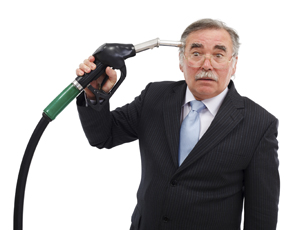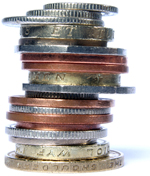We are all painfully aware of the soaring price of fuel and the affect it has on both our private and business lives. Although prices have fallen a little during the past few weeks, the high cost of filling our tanks is still a distress purchase and it seems there is nothing we can do but grin and bear it.
Motorists and hauliers have not always been so willing to accept high fuel prices; the fuel protests of September 2000 almost brought the country to a standstill and the Blair government to its knees. The price of diesel had risen to a staggering 80p a litre and many in the transport industry just said NO! But despite this rather un-British direct action - more commonly seen on the other side of the Channel - the protest achieved very little and that’s probably why it has not been repeated – the chaos it caused just wasn’t worth it.
What the protesters will think today when they see pump prices approaching double those they fought to reduce eleven years ago probably couldn’t be printed in The Mover but they, like everyone else, have no option but to cough up.
So, who’s making all the money? No surprise here, it’s the government of course. Out of every litre of diesel costing £138 a whopping 81p is taken by the government in fuel duty and VAT. The remaining 57p is split between the manufacturer who takes around 52p and the retailer who gets the remaining 5p - no wonder petrol stations are closing at the rate of around 500 a year.
Perhaps surprisingly the cost of crude oil only affects about 30% of the total cost of a litre of petrol or diesel, so even substantial increases in oil prices have a relatively small influence on the overall cost. However, despite a fall in oil prices of 18% between April and August the price of unleaded petrol actually increased by 1.8%. The group representing independent forecourts blamed other factors including exchange rates for the mysterious increase.
Another puzzling question is why diesel now costs more than petrol when for years it was always substantially cheaper? The answer apparently is that modern ultra-low sulphur diesel costs more to refine than the black smoke belching stuff we used in the past and that puts about 5p on every litre.
Although fuel prices in the UK are high they are not the most expensive in Europe. Spare a thought for the Norwegians; they have to fork out 1.82 euros a litre for unleaded and 1.72 euros for diesel. Generally, petrol prices in Europe – other than those in the former eastern block - are similar to the UK’s, but diesel prices, with the exception of Norway, are much lower. A litre of diesel in France costs 1.30 euros compared with a UK price of 1.52 euros and in Spain and Austria it’s a lowly 1.26 euros. If you want a real bargain fill up in Luxembourg where a litre of diesel costs just 1.15 euros. No wonder so many continental trucks are fitted with oversize fuel tanks.

Interestingly the UK, Sweden, Estonia and Switzerland are the only countries in Europe where diesel is more expensive than petrol, despite it costing more to manufacture. It seems other countries realise the crippling costs of running commercial vehicles has a knock-on affect throughout the economy and have taken steps to address the problem. Unfortunately the British government doesn’t see things that way and are content for businesses that rely on transport for their livelihoods to struggle on.
While none of us want to see a return of the disruption caused by the fuel protests of 2000, something needs to be done. In March an organisation led by motoring journalist Quentin Wilson – FairFuelUK - presented a petition with over 130,000 signatures to the Prime Minister calling for a reduction in fuel duty. Since then the campaign has been joined by Robert Halfon MP who has launched an e-petition calling for the government to scrap the planned 4p increase in fuel duty scheduled for January and August next year and for the creation of a fuel price stabiliser to smooth out fluctuations in pump prices. Signatures currently stand at over 66,000 - if 100,000 are received the issues raised will be eligible for debate in parliament.
For more information visit www.fairfueluk.com.
Fuel prices in Europe
| Austria | 1.34 | 1.26 |
| Belgium | 1.42 | 1.27 |
| Czech Rep | 1.32 | 1.32 |
| Denmark | 1.62 | 1.47 |
| Estonia | 1.26 | 1.32 |
| Finland | 1.60 | 1.35 |
| France | 1.48 | 1.30 |
| Germany | 1.54 | 1.43 |
| Greece | 1.62 | 1.42 |
| Hungary | 1.44 | 1.43 |
| Ireland | 1.44 | 1.34 |
| Italy | 1.59 | 1.47 |
| Latvia | 1.28 | 1.24 |
| Lithuania | 1.30 | 1.20 |
| Luxembourg | 1.28 | 1.15 |
| Netherlands | 1.57 | 1.27 |
| Norway | 1.82 | 1.72 |
| Poland | 1.29 | 1.29 |
| Portugal | 1.56 | 1.38 |
| Slovakia | 1.46 | 1.34 |
| Slovenia | 1.25 | 1.26 |
| Spain | 1.33 | 1.26 |
| Sweden | 1.47 | 1.48 |
| Switzerland | 1.35 | 1.43 |
| United Kingdom | 1.47 | 1.52 |
Source: www.drive-alive.co.uk
Fuel duty stabiliser
In Budget of 2011, the Chancellor announced the introduction of a fair fuel stabiliser that would peg future fuel duty increases to retail price inflation (RPI) when oil prices are high. When the oil price falls below a set trigger price on a sustained basis, the government will increase fuel duty by the current escalator commitment of RPI plus 1 penny per litre.
The government believes that a trigger price of $75 per barrel would be appropriate, and will set a final level and mechanism after seeking the views of oil companies and motoring groups. During the consultation the government will want to decide the level of the trigger mechanism and at what price level it should cut in.
To pay for this fail fuel stabiliser during periods of high world oil prices, the rate of Supplementary Charge levied on profits from UK oil and gas production has increased to 32 per cent. As part of the fair fuel stabiliser, if in future years the oil price falls below the set trigger price on a sustained basis, the government has committed to reduce the Supplementary Charge back towards 20 per cent on a staged and affordable basis.
High fuel prices continue to increase operating costs
 The high cost of fuel remains the biggest cause for concern amongst vehicle operators, according to the July 2011 update of the Freight Transport Association’s Manager’s Guide to Distribution Costs.
The high cost of fuel remains the biggest cause for concern amongst vehicle operators, according to the July 2011 update of the Freight Transport Association’s Manager’s Guide to Distribution Costs.
FTA’s latest update calculates that, on average, vehicle operating costs for rigid, articulated and drawbar vehicles have risen by 5.6% in the year to 1 July, 2011 and remain close to the all-time highs recorded as at 1 April, 2011. The largest contribution to the rise came from an increase in the price of diesel, which has risen by 12% in the year to 1 July, 2011. In addition, tyre costs have risen by 7.3% and overheads by 5% in the same period.
FTA’s Manager’s Guide to Distribution Costs is produced annually based on data gathered from a survey of FTA members in April each year, as well as data from other independent sources. The data on wages, vehicle operating costs and haulage trends is then updated quarterly as at 1 July, 1 October and 1 January.
Average cost movements for the 12 months to 1 July, 2011 for rigid, articulated and drawbar vehicles:
| VED | 0.0 |
| Insurance | +2.1 |
| Depreciation | 0.0 |
| Diesel | +12.0 |
| Tyres | +7.3 |
| Maintenance | +3.9 |
| Employment cost of driver | +2.1 |
| Overheads | +5.0 |
| Vehicle costs | +7.7 |
| Vehicle and driver costs | +5.7 |
| Total vehicle operating costs | +5.6 |
| Total vehicle operating costs excluding fuel | +2.8 |
FairFuelUK petition leads on new government e-Petition site
 The FairFuelUK petition on the new government e-Petition site is currently heading the list with over 96,000 signatures. This new government initiative means that if the e-Petition receives 100,000 or more supporters it will almost certainly force a full debate in Parliament on the issue. The link to the e-petition is http://epetitions.direct.gov.uk/petitions/347. The petition asks the government to scrap the planned 4p per litre fuel duty increases scheduled for January and August 2012 and to implement actions to bring down and stabilise fuel prices.
The FairFuelUK petition on the new government e-Petition site is currently heading the list with over 96,000 signatures. This new government initiative means that if the e-Petition receives 100,000 or more supporters it will almost certainly force a full debate in Parliament on the issue. The link to the e-petition is http://epetitions.direct.gov.uk/petitions/347. The petition asks the government to scrap the planned 4p per litre fuel duty increases scheduled for January and August 2012 and to implement actions to bring down and stabilise fuel prices.
James Hookham, FTA’s MD of Policy and Communications, said: "The government wants to know what is the UK's top concern, well this is it. It is not just motorists whose lives are being made a misery, commercial vehicle operators whose businesses hang in the balance are being forced to make some very tough decisions - those that can't pass on their costs are in danger of falling into the abyss."
Quentin Willson, leader of the FairFuelUK campaign said, “We know from the massive support that FairFuelUK has already received that petrol and diesel prices are right up at the top of the public’s agenda. This is backed up our polling data. The wheels of the economy are literally grinding to a halt. The government has a golden opportunity to boost growth, reduce inflation and give the economy the kickstart that it deserves by getting fuel prices down. I am urging everyone that cares about petrol/diesel prices and the economy to get behind this – let’s get the politicians talking about fuel.”
Robert Halfon, MP for Harlow said, “A full debate in Parliament on petrol and diesel prices is a necessity. To those 'do-gooders' who say we shouldn't be using cars, I say get in the real world. The question is not can you afford to have a car - but can you afford not to: Britain is a great car economy.”
The FairFuelUK campaign has attracted massive support in its own right with over 180,000 signatures on its own petition at www.fairfueluk.com. It is formally backed and supported by the RAC, the RHA the FTA.